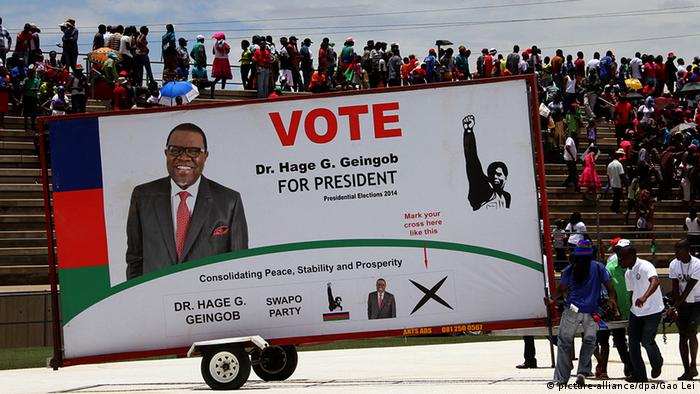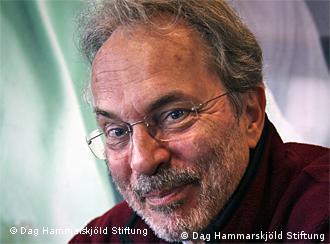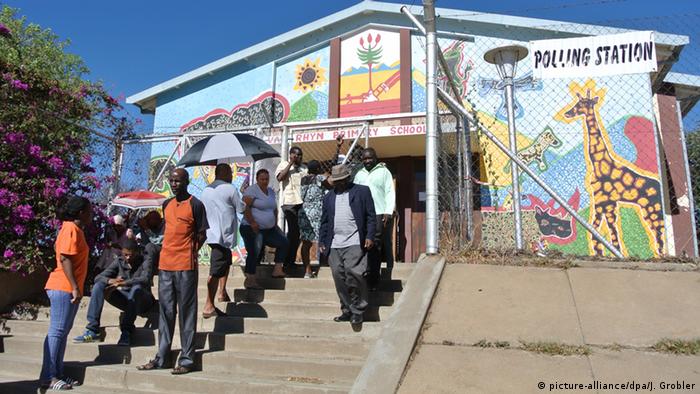Problems with electronic voting
Shortly before the elections, the country in southwest Africa has been presenting itself as a modern and voter-friendly country. Electronic voting machines have been installed for the first time in about 1,200 fixed and 2,700 mobile polling stations. They were imported from India and have some hitches. For example, they cannot provide a printout that could serve as evidence if the result is disputed. This has led to some opposition parties threatening to challenge the results, said Melber. In his view, the use of electronic voting machines is somewhat premature "and has generated mistrust among the population."

For the first time, the country made use of electronic voting machines (EVM), but it still took three days to announce the poll results of 900,000 voters. And the outcome was impossible to verify as the EVMs, which have been rejected by several countries, leave no paper trail, while the corroborating process conducted by the Electoral Commission of Namibia remained undisclosed. The EVMs experienced a myriad of technical problems during the elections, while mobile polling stations neglected to show up at 77 sites. Adding to the intrigue, the Coordinator of Information Technology at the electoral commission is the chairperson of a Swapo branch in Windhoek. All this undoubtedly casts serious doubts on the credibility of the elections. And against the background of the 2009 national elections, when the end results were challenged by the opposition parties but thrown out by the Namibian Supreme Court due to a minor technicality, the question marks will continue to hang over these election outcomes.
Nonetheless, the electoral triumph only temporarily conceals an organic crisis in Swapo as the organisation was in the process of fracturing prior to the balloting. Due to intense factional enmity, especially between the older and younger generations over entry into State resources, about half of the members picked at the Swapo Electoral College were relatively unknown youth, while those from the old guard were shoved far down the parliamentary list. All four candidates of the foremost trade union federation, the National Union of Namibian Workers, did not make it onto the parliamentary list which reveals the comprehensive loss of power of the trade union movement that is in an alliance with Swapo. Then again, the landslide win of Swapo not only ensures that many of the older cadres retain their parliamentary seats, but also maintains, for now, some level of harmony in the political party.
Concurrently, the rival organisations cannot match Swapo’s resources and its total dominance of the national television channel and radio stations, from which most Namibians obtain their information. In addition to having unfettered access to State assets, the Swapo leadership has consistently over the years terminated television and radio programs that are too critical of the party. In one incident, a Swapo councillor assaulted, in a radio studio of the national broadcaster, a presenter who happened to be a central committee member of the then main opposition party, the Rally for Democracy and Progress (RDP). All this makes a wide-ranging dialogue about alternate ideas an exceedingly onerous task in that society. Regrettably, after 100 years of colonialism, there is no viable left-wing alternative in a country characterised by a disconcertingly conservative mass consciousness.
Several of the opposition parties, that is, the RDP, the Congress of Democrats (COD) and the All People’s Party (APP), were led by former Swapo members who quit the ruling party due to its autocratic culture. Though their political programs do not diverge from that of Swapo, the RDP, for instance, espoused in its manifesto a free market system and upheld the strengthening of English as medium of instruction despite the deep-seated education disaster created by this.
The just-elected primary opposition party is the previous colonial party, the Democratic Turnhalle Alliance (DTA), which has a significant resource base but lacks political credibility. This outfit, which is considering a name change in order to shake off its colonial baggage, won only 5 seats compared to Swapo’s 77 seats in the National Assembly. The other previous national liberation movement, the South-West African National Union (Swanu), is undoubtedly waning and was fortunate to garner one seat through the surplus votes system. The prominent ex-president of Swanu, Vekuii Rukoro, of late became embroiled in a tussle over a tribal chieftaincy. The Namibia Economic Freedom Fighters (NEFF), a party of homophobia and xenophobia, flopped and could not secure a single seat.
As a first, a tiny left-wing party, the Workers’ Revolutionary Party (WRP), which formed an electoral pact with the Communist Party (CP), acquired two seats in the National Assembly. What was different about this election for the WRP was that its political base shifted completely as almost its entire parliamentary list, actually drawn up by the CP, consisted of ex-members of the colonial army, the South-West African Territorial Force (SWATF), and Koevoet, a special counter-insurgency police unit during colonial occupation. So, the parliamentary seats will be taken up by figureheads of the former SWATF/Koevoet who have felt aggrieved about pension pay-outs blocked by the Swapo government.
Possibly not expecting to attain seats, both leaders of the WRP and CP were absent from the parliamentary list and no prior discussions were held with parliamentary candidates about the right to recall and only earning the average income of a worker from the lucrative seat, with the rest going to the organisation. Winning two seats covers up the fact that the WRP and CP will in the longer term pay a heavy price, ideologically and organisationally, for this tactical blunder of drawing in former militarist elements that are spurned by the majority of the Namibian working class. Unfortunately, the miniscule left-wing parties abandoned their ideological direction long ago due to their conflation of ethnocentrism and the right of nations to self-determination. After all, the left-wing should be able to differentiate between, on the one hand, building national unity and, on the other hand, identifying genuine social forces that could bring about a fundamental social transformation.
Swapo, if truth be told, has never been a socialist or Marxist organisation, but was since its inception an organisation of conservative Pan-Africanism. It had an ineffectual armed struggle as the older leadership seemed to be more concerned about being surpassed by the militant younger generation of the 1971 general strike, the key turning point in the anti-colonial struggle of Namibia. And, following the stalemate of the battle for Cuito
High unemployment rate and high prices
According to Melber, solidarity with government policies is not unlimited. "It's bubbling at the base. Social unrest is on the increase. Criticism within the party, particularly within the Youth League, of the abuse of power is also increasing." Land ownership has become campaign issue number one. Many Namibians, especially those living in urban areas, can hardly afford apartments and land. In the past few days, SWAPO Youth League spokesman Amupanda has vigorously criticized the government's land policy. "60 percent of all Namibians are young people. Our leadership is old. We are governed by old people who do not understand the problems of young people. They're just eager to enrich themselves," he said.
Cuanavale, which was all about defending Angola, Swapo was compelled to accept a limited decolonisation with serious compromises that kept the wealth in the hands of the former colonisers while simultaneously agreeing to the implementation of neoliberal economic policies.
What is often overlooked is that the political independence of Namibia came about through a negotiated settlement with Swapo not even being present at the negotiating table. So, compromise was dressed up as victory. Behind the smokescreen of national reconciliation, issues of social inequality have been deliberately glossed over by Swapo elites, who have been self-congratulatory about the alleged peace and stability in the country. This, of course, is disproven by the increasing militarisation in that society. Besides several military bases from the colonial era, the Swapo government is in the process of constructing five new army bases for a population of two million people.
The previous editor of The Namibian newspaper, Gwen Lister, in her weekly column, not long ago accused Swapo of not having kept true to most of the national liberation promises since political independence. She writes: ‘In the consolidation of power accompanied by rising levels of greed and entitlement over the years, leaders have become arrogant and complacent and out of touch with the people’. Regarding the rest of the political parties, Lister refers to ‘… the plethora of mainly unimpressive opposition parties’. The situation is that these rival groups vie with Swapo on the basis of centre-right policies and the promise of less corruption, but are wholly tongue-tied about neo-liberalism and fundamental socio-economic issues.
This is truly astonishing given the state of affairs that Namibia, after South Africa, has the highest level of inequality in the world. Sixty percent of Namibian households live on an income of 1,000 Namibian dollars [1,000 South African rands or about 100 US dollars] a month or less, while only 1.2 percent of households earn more than 10,000 Namibian dollars [about 1,000 US dollars] per month. An estimated 25 percent of the Namibian population reside in informal settlements. Moreover, Namibia has the second highest house-price inflation in the world. A recent survey showed an inflation rise of 29 percent every year, second only to Dubai. And less than 10 percent of households can afford a property in the lower range
Namibia inherited a branch-type economy and imports virtually everything from the former coloniser, South Africa. No significant manufacturing takes place inside the social formation and the economy is largely based on mineral extraction. With the latest Husab uranium mine, Namibia will become the second largest uranium producer on the globe, once again confirming the enormous mineral wealth in that society. However, the Namibian working people hardly benefit from this as can be seen, for instance, in the fact that the country’s oldest uranium mine, Rossing Uranium, which has been operating there since the 1970s, only started paying royalties to the government from 2006. Perhaps this shows the extent to which the Swapo government is in the pocket of the multinational corporations (and, generally, finance capital).
The lesson for the working people of Namibia from the 2014 general election is, once again, that liberal democratic balloting is undoubtedly not some neutral event; it reflects power relations at that juncture and serves as camouflage for social inequality. Voting in such elections does not translate into food, jobs and houses for the working class. In fact, the working people will have to prioritise building a grassroots democracy through community organisations, workers’ committees, feminist formations, radical study groups, etc.
Lastly, one of Namibia’s discerning public intellectuals, Ndumba Kamwanyah, maintains that: ‘There is also the reality that almost half of our population depends on wells for their drinking water; their daily diet consists mainly of grain; and their cooking is done on wood fire… We cannot ignore the growing evidence that a plague of catastrophic proportions is looming. Time is running out.’ A week before the latest elections, at least 3,000 young people, mainly Swapo members, demonstrated in front of the Swapo-controlled Windhoek municipality against the unaffordable housing prices. The Affirmative Repositioning group handed in 14,000 applications for plots and gave the municipality until July 2015 to respond. What should be of great concern to the elite is that the same discontent can be found in informal settlements throughout the country. Of course, the restlessness of the youth about the explosive housing/land question is sooner or later going to be trailed by that of the working people. So, despite having won the national electi
E-voting, gender equality in focus in Namibian elections.
Namibians have been casting their ballots in a general election dubbed Africa's first e-vote. There were long queues in front of polling stations before they opened on Friday morning.
DW: SWAPO, Namibia's liberation movement turned ruling party, returned to power. In 2009, SWAPO garnered 75 percent of the vote. How big a challenge is the opposition expected to mount to SWAPO this time round?
Henning Melber: The opposition is as big as it used to be - which means it hardly is any challenge. If there is any challenge for SWAPO and its dominance, then it is the failures of delivery by SWAPO itself.
There is a quota system in place to get more women into parliament. What can you tell us about this?
SWAPO took a so-called "zebra" decision a year ago which meant that their own electoral list is comprised of men and women in equal numbers. That means half of the SWAPO members of parliament to be elected will be female.
So this is an effective contribution to gender equality then?
It certainly is, despite the fact that some of the old folks in SWAPO, meaning the old men, seemed to have regretted it afterwards. This was one of the reasons that the members of parliament expanded from 72 seats to 96 seats to allow more male candidates from the SWAPO party list to become or rather continue to be members of parliament, as from March 2015 onwards.
These elections are going to be carried out with Indian-made electronic voting machines. There was an opposition challenge to this - why?

Henning Melber is a German-Namibian political scientist
According to the electoral act which was adopted in August this year, those voting machines, to avoid the impression or suspicion of manipulation, should also have a paper tray. What was unknown when the electoral act was endorsed was that the machines delivered by India are technologically not yet up to standard and were without any paper trays. That was the reason for the biggest opposition party to launch an urgent appeal in the court which was dismissed because they wanted to postpone the elections with the argument that in the absence of the paper tray the conditions as stipulated in the electoral act are not met.
Are Namibians or the authorities in that matter anticipating any technical problems?
It's difficult to predict. These will be the first EDV machine elections on the continent and one would actually not know really if there are any technological problems. What was known was that, by the beginning of this week, the electoral commission of Namibia was still lacking 800 vehicles for the ordinary conduct of the elections. They had up to then 2,200 vehicles and they require another 600 or 800 vehicles within the next days. So, that seems to suggest - also based on previous experiences - that the Namibian electoral commission is not always up to standard and one cannot predict really what flaws or hiccups or any other unforeseen errors might occur.
Hage Geingob, the SWAPO candidate and current prime minister, is tipped to become the next president. What do Namibians expect from him?
They would expect from him smooth and good governance, guided by competence and in the interest of the people. But it is another question if he is delivering that. Hage Geingob has the image of a technocrat but he is also known for finding pleasure in a luxury life and he also sees no conflict of interest in acting both as a member of parliament and running a private consultancy, doing business with big mining companies. So there are second thoughts if the good governance and the fighting of corruption which the Namibians would expect will be delivered under a presidency of Hage Geingob.
Namibia is a former German colony. How would you describe present-day bilateral ties with the former colonial power?

No comments:
Post a Comment